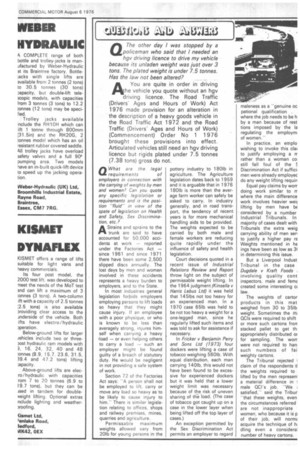Cl What are the legal requirements of employers in connection with
Page 35

If you've noticed an error in this article please click here to report it so we can fix it.
the carrying of weights by men and women? Can you quote any specific legislation or requirements and is the position -fluidin view of the spate of legislation on Health and Safety, Sex Discrimination, etc.?
AStrains and sprains to the trunk are said to have accounted for 50,000 accidents at work — reported under the Factories Act — since 1961 and since 1971 there have been some 2,500 slipped discs annually. The lost days by men and women involved in these accidents represents a heavy burden to employers, and to the State.
In most industries general legislation forbids employers employing persons to lift loads so heavy that they might cause injury. If an employee with a poor physique, or who is known to be less than averagely strong, injures himself when carrying a heavy 4load — or even helping others to carry a load -such an employer might be found guilty of a breach of statutory duty. He would be negligent in not providing a safe system of work.
Section 72 of the Factories Act says: "A person shall not be employed to lift, carry or move any load so heavy as to be likely to cause injury to him." There is similar legislation relating to offices, shops and railway premises, mines, quarries and agriculture.
Permissable maximum weights allowed vary from 201b for young persons in the pottery industry to 1801b in agriculture. The Agriculture legislation dates back to 1959 and it is arguable that in 1976 1801b is more than the average farm worker can safely be asked to carry. In industry generally, and in road transport, the tendency of recent years is for more mechanical handling aids to be provided. The weights expected to be carried by both male and female workers are reducing quite rapidly under the influence of safety and health legislation.
Court decisions quoted in a recent issue of Industrial Relations Review and Report throw light on the subject of permissable weight lifting. In the 1964 judgment (Kinsella v Harris Lebus Ltd) it was held that 145Ibs not too heavy for an experienced man. In a 1970 case 651b was held to be not too heavy a weight for a one-legged man, since he regularly lifted such items and was told to ask for assistance if necessary.
In Fricker v Benjamin Perry and Sons Ltd (1973) four dockers were lifting a case of tobacco weighing 560Ib. With equal distribution, each man carrying 140Ib, this would not have been found to be excessive for experienced dockers but it was held that a lower weight limit was necessary because of the risk of uneven sharing of the load. (The case of tobacco got caught up on a case in the lower layer when being lifted off the top layer of cases.) An exception permitted by the Sex Discrimination Act permits an employer to regard
maleness as a "genuine oc pational qualification . where the job needs to be h by a man because of rest tions imposed by the la regulating the employm, of women.
In practice, an empla wishing to invoke this clat to justify employing a rr rather than a woman co still fall foul of the Discrimination Act if suffici, men were already employec do any weight lifting requir, Equal pay claims by worr doing work similar to rr where the main difference work involves heavier weit lifting by men have bE considered by a number Industrial Tribunals. In majority of cases dealt with Tribunals the extra weig carrying ability of men sen to justify a higher pay ra Weights mentioned in he irigs have been as low as 31 in determining this issue.
But a Liverpool Indust Tribunal in the case Dugdale v Kraft Foods involving quality cont inspectors, male and ferns created some interesting law.
The weights of cartor products in this mat weighed from 30 to 35Ib weight. Sometimes the m; QC's were required to shift or more such cartons from stacked pallet to get th appropriately distributed or for sampling. The worr were not required to han such numbers of fai weighty cartons.
The Tribunal rejected 1 claim of the respondents tl the weights required to lifted by the men represeni a material difference in 1 male QCI's job. "We ; satisfied," said the Tribur "that these weights, even the circumstances referred are not inappropriate women, who because it is p of their job, will norms acquire the technique of h; dling even a consideral number of heavy cartons.




















































































